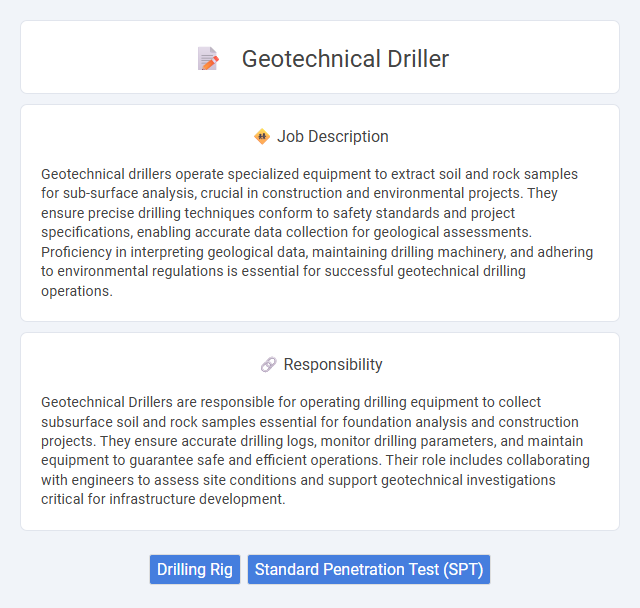
Geotechnical drillers operate specialized equipment to extract soil and rock samples for sub-surface analysis, crucial in construction and environmental projects. They ensure precise drilling techniques conform to safety standards and project specifications, enabling accurate data collection for geological assessments. Proficiency in interpreting geological data, maintaining drilling machinery, and adhering to environmental regulations is essential for successful geotechnical drilling operations.
Individuals who enjoy outdoor work and physical activity are more likely to find success as geotechnical drillers, as the role often involves operating heavy machinery in various weather conditions. Those with strong attention to detail and problem-solving skills may also be well-suited, given the technical aspects of soil sampling and data collection. However, candidates who prefer sedentary or indoor work environments might not find this job as suitable due to its demanding and dynamic nature.
Qualification
A Geotechnical Driller must possess a high school diploma or GED, with specialized training in drill rig operation and safety protocols essential for soil and rock sampling. Proficiency in operating various drilling equipment and understanding of geotechnical engineering principles are critical qualifications. Certification in hazardous materials handling and compliance with OSHA standards enhances job performance and safety adherence.
Responsibility
Geotechnical Drillers are responsible for operating drilling equipment to collect subsurface soil and rock samples essential for foundation analysis and construction projects. They ensure accurate drilling logs, monitor drilling parameters, and maintain equipment to guarantee safe and efficient operations. Their role includes collaborating with engineers to assess site conditions and support geotechnical investigations critical for infrastructure development.
Benefit
A career as a Geotechnical Driller probably offers competitive wages and opportunities for overtime pay, enhancing overall income potential. Workers may benefit from hands-on experience in diverse soil and rock sampling, which could improve job prospects in construction and environmental sectors. Health and safety training is commonly provided, likely ensuring a safer work environment on-site.
Challenge
Geotechnical Drillers likely face challenges related to operating heavy machinery in varied soil and rock conditions, requiring precise techniques to obtain accurate subsurface samples. They may encounter unpredictable ground compositions and environmental factors that increase the complexity of drilling tasks. Ensuring safety and equipment maintenance under these conditions probably adds another layer of difficulty to the role.
Career Advancement
Geotechnical drillers gain expertise in soil sampling and subsurface investigation techniques, essential for advancing to roles such as site engineer or project manager. Mastery of drilling equipment operation and safety protocols enhances opportunities for leadership positions within construction and environmental consulting firms. Continuous skill development and certifications in geotechnical analysis directly impact career growth and earning potential.
Key Terms
Drilling Rig
A Geotechnical Driller operates drilling rigs to collect soil, rock, and groundwater samples for subsurface investigation in construction and environmental projects. Expertise in setting up, maintaining, and controlling rotary, auger, or sonic drilling rigs is essential for accurate sample extraction and site analysis. Mastery of drilling rig components, safety protocols, and data recording ensures efficient and precise geotechnical exploration.
Standard Penetration Test (SPT)
Geotechnical drillers play a crucial role in conducting Standard Penetration Tests (SPT) to assess soil properties and subsurface conditions. They operate drilling rigs to collect soil samples at designated depths, ensuring precise blow counts that indicate soil density and strength. Accurate SPT data assists engineers in making informed decisions for foundation design and construction safety.
 kuljobs.com
kuljobs.com